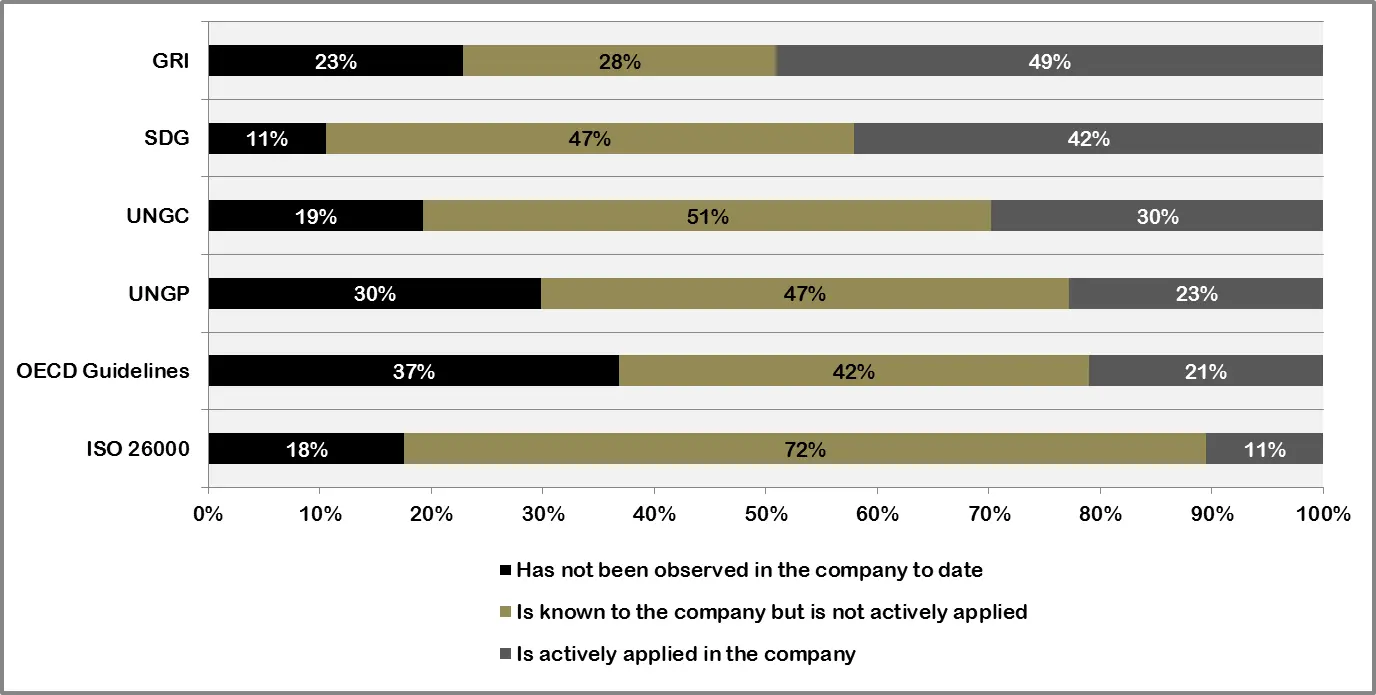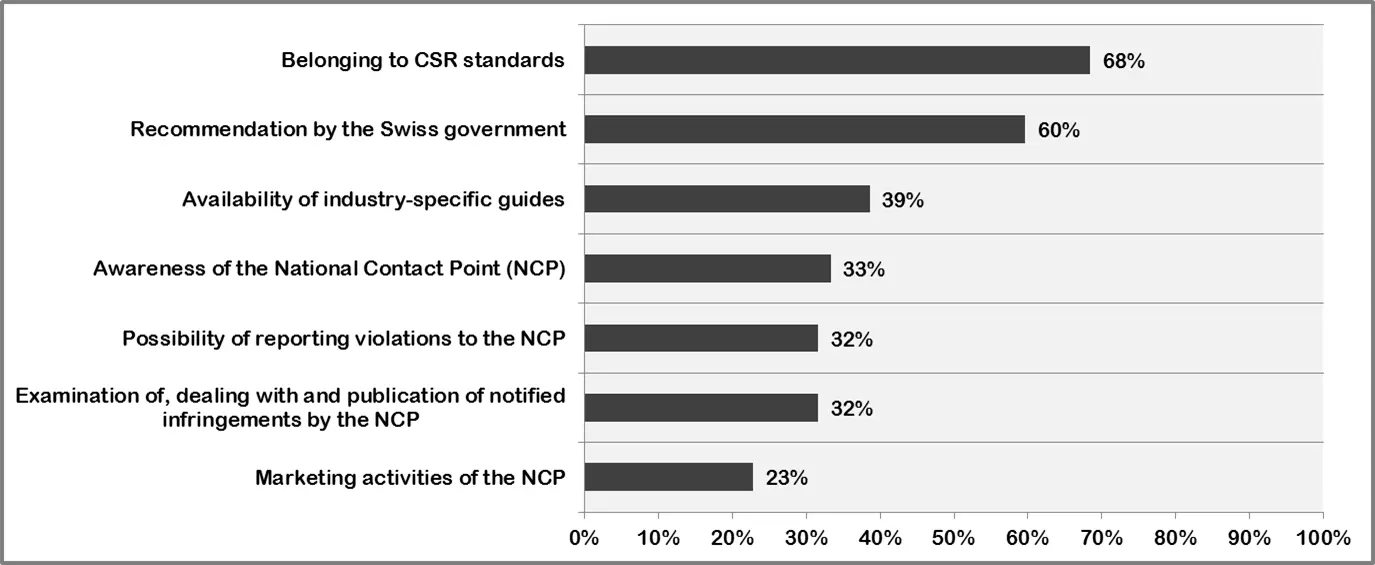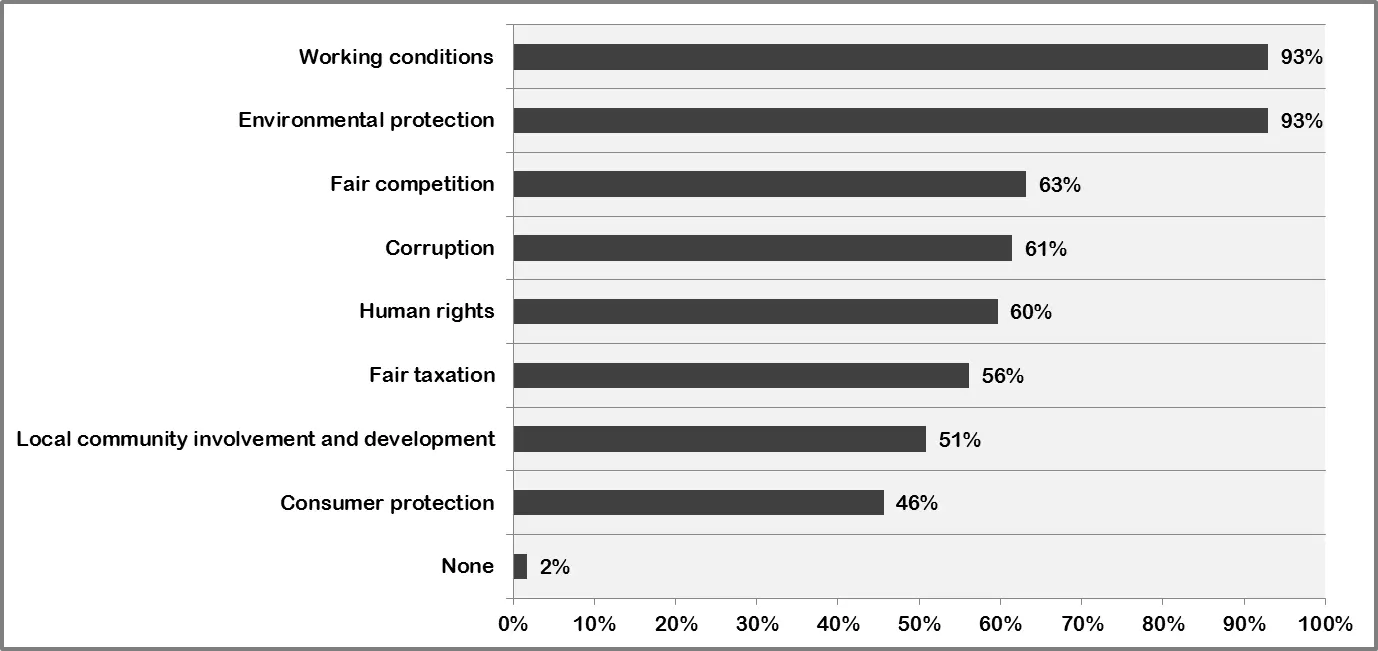SML study on the degree of awareness of the OECD Guidelines and their significance in Swiss enterprises
An interdisciplinary team of researchers, commissioned by the State Secretariat for Economic Affairs (SECO) and the Swiss Agency for Development and Cooperation (SDC) and led by the Center for Corporate Responsibility, analysed the degree of awareness of the OECD Guidelines and their relevance to Swiss businesses, as compared with other CSR standards.
Background
Enterprises often refer to internationally accepted and legitimised Corporate Social Responsibility (CSR) standards in order to fulfil their social responsibility and meet the expectations of interest groups regarding sustainable management. These are used by businesses for various purposes and vary as regards the degree to which they are binding, from non-binding guidelines, such as ISO 26000 Social Responsibility, to certified standards with third-party auditing, such as ISO 14001 Environmental Management. The OECD Guidelines for multinational enterprises have special standing: since signatory states are required to establish a National Contact Point (NCP) and a complaints procedure, the Guidelines have a sovereign component.
To determine the importance of the OECD Guidelines and the NCP in Switzerland, the State Secretariat for Economic Affairs (SECO) and the Swiss Agency for Development and Cooperation (SDC) commissioned a study which aimed to analyse the degree of awareness of the Guidelines and their relevance in Swiss enterprises, as compared with other CSR standards. At the same time, information on enterprises’ need of support in implementing the OECD Guidelines was collected.
Swiss National Contact Point (NCP)
The NCP promotes the observance of the OECD Guidelines and discusses all relevant issues with the parties concerned in order to contribute to the resolution of any problems that may arise. Both individuals and interest groups may address the NCP if they wish to report a company’s breach of the Guidelines. In Switzerland, the NCP is located at the State Secretariat of Economic Affairs (SECO).
Methodological approach - quantitative analysis and qualitative interviews
To achieve the aims of the study, the research team chose a multimethod approach which consisted of three steps.
Step 1: Report analysis
In this step, the reports of the 500 Swiss enterprises with the highest revenue (“Top 500”), as well as the reports of ten international SMEs, were analysed regarding the use of international standards of responsible management, including the OECD Guidelines.
Step 2: Survey
In the second step, an online survey directed at multinational enterprises based in Switzerland aimed to determine the degree of awareness of the OECD Guidelines and their relevance, as compared with other standards of responsible management. The standards used for comparison were the UN Global Compact (UNGC), standards of the Global Reporting Initiative (GRI), the UN Guiding Principles on Business and Human Rights (UNGP), the Sustainable Development Goals (SDG) and ISO 26000 Guidance on Social Responsibility. These all have international reach, cover various aspects of CSR and act as guidelines for company practices.
Step 3: Focus-group interviews
Following the survey, focus-group interviews were conducted with representatives from selected enterprises to help interpret the results and to link them with the personal experiences of managers from different enterprises.
International CSR standards
OECD Guidelines for Multinational Companies
The OECD Guidelines are recommendations addressed to multinational enterprises by the governments of the 35 OECD member states and thirteen other states.
UN Global Compact
With its 10 universal principles on human rights, working standards, the environment and combating corruption, the UNGC offers an introduction to CSR issues and serves as a networking and learning platform.
Global Reporting Initiative
The GRI provides a globally applicable framework for drawing up sustainability reports in accordance with internationally recognised criteria
UN Guiding Principles on Business and Human Rights
The UNGP include 31 principles and are based on three pillars: state duty, corporate responsibility and access to remedy.
Sustainable Development Goals
The SDG are political goals set by the UN to ensure sustainable economic, social and ecological development.
ISO 26000 Guidance on Social Responsibility
ISO 26000 provides a comprehensive understanding of social responsibility. However, it is not certifiable, as are other ISO standards.
While the survey allows reliable conclusions to be drawn on the prevalence of CSR standards within Top 500 enterprises, the results of the survey are influenced by the fact that there was a tendency for enterprises with a higher affinity with CSR to take part. Nevertheless, the survey yielded interesting results on the relative significance of CSR standards, the relevant aspects of CSR and the elements of management applied.
Of the enterprises that took part in the survey, 63% of them (74% large enterprises, 33% SMEs) that took part in the survey indicated knowledge of the OECD Guidelines, while 21% (26% large enterprises, 7% SMEs) actively use the Guidelines. With the exception of ISO 26000 (regarding active use), all standards used for comparison are more prevalent, both in terms of familiarity and of active use.
An analysis of the reporting of the Top 500 enterprises allows for a more reliable picture of the absolute distribution of the standards in large Swiss enterprises.
Assuming that the enterprises actively apply the CSR standards mentioned in their reports, the OECD Guidelines have an application level of 2%. Comparable CSR standards are actively used up to ten times more frequently; 21% of the enterprises use the GRI actively, 12% use the UNGC, 10% use the SDG, 5% use the UNGP and 2% use ISO 26000.
The discrepancies in the results of the survey and the report analysis stem from the fact that more enterprises with a higher awareness of CSR or who implement CSR took part in the survey. This applies to around a third of the Top 500 enterprises, assuming that large enterprises who actively practice CSR also have publicly accessible sustainability reporting.
The relative level of familiarity with CSR standards in both SMEs and large enterprises is similar in both samples. In the survey too, the GRI, SDG and UNGC have the greatest relative significance, while ISO 26000, the OECD Guidelines and the UNGP are less significant to enterprises. Reasons discussed for the fact that the OECD Guidelines were less significant in comparison with other CSR standards included a lack of promotion on the part of enterprises involved, an unclear range of benefits or the proximity to state institutions
Large enterprises are clearly more aware of the existence of the OEDC Guidelines and their characteristics than SMEs, though there is a noticeable gap between those who are aware of the Guidelines (68%) and those who have detailed knowledge of the Guidelines’ characteristics.
Of the enterprises, 60% are aware that the use of the OEDC Guidelines is recommended by the government and 39% know that there are industry-specific Guidelines, while 33% know of the existence of the NCP and 32% know that violations can be reported to the NCP and have an idea of the procedure that follows. Furthermore, 23% are aware of the NCP’s marketing activities for the OECD Guidelines.
Distribution of management approaches for various aspects of CSR
Frequency of companies’ actively addressing CSR issues as reported in the survey (Image: ZHAW)
Although only 21% of the enterprises surveyed (large enterprises: 26%, SMEs: 7%) actively apply the OECD Guidelines, at least 46% of the enterprises represented in the survey (large enterprises: at least 53%, SMEs: at least 20%) actively apply the aspects of CSR addressed in the Guidelines (e.g. working conditions, human rights, environmental protection).Working conditions and environmental protection are even actively addressed by 93% of the enterprises surveyed. When CSR issues are actively addressed, all elements of a systematic management approach are applied. Depending on the aspect of CSR being discussed, 32% to 41% of the enterprises surveyed cited concrete implementation methods. Strategies and goals for the relevant aspects were formulated to a lesser degree (15%-27%), and third parties brought in in 24%-31% of cases. Success monitoring was implemented less frequently (10%-14%).
Use of international CSR standards
Where CSR standards are applied, they most frequently serve as a source of inspiration, a means of commitment to CSR principles or a guide to concrete implementation. The varying degrees of significance and types of application of CSR standards seem to be of importance depending on the degree of maturity of CSR in the enterprise. The more general standards, such as the UNGC, are important in early orientation phases, but lose their importance as the CSR standards in the enterprise mature. Concrete, topic-specific standards, such as ISO 14001, become important when enterprises develop a systematic approach to CSR. Enterprises consider an exchange of information and experience between companies that apply the same standard to be an important additional benefit.
Recommendations for wider dissemination of OECD Guidelines
With a view to increasing the dissemination of good CSR practices in Swiss companies, several recommendations can be made, based on the findings of the study.The OECD Guidelines should be made more widely known and their benefits for enterprises should be presented in more detail. The perceived distance between the OECD Guidelines and the business world should be bridged, and the coherence between the OECD Guidelines and alternative CSR standards made clear. The dissemination of CSR practices independent of the use of standards should be promoted. Finally, the status of CSR practice in Swiss enterprises should be followed up in a longitudinal study.
Download
The project’s final report is available on the State Secretariat for Economic Affairs (SECO) website.
Contact
Herbert Winistörfer, Head Center for Corporate Responsibility, ZHAW School of Management and Law, Phone: +41 (0)58 934 76 75, E-Mail: herbert.winistoerfer@zhaw.ch


